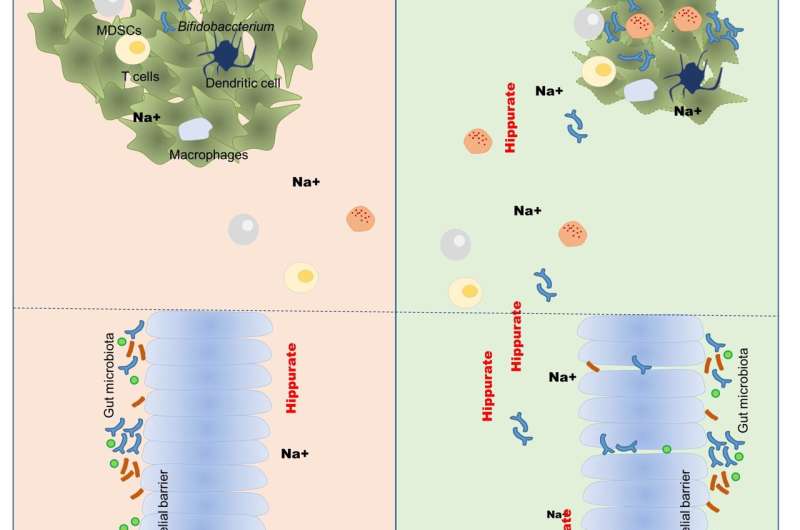September 20, 2021 report
Adding salt to the mouse diet found to suppress cancerous tumor growth

A team of researchers at the Translational Health Science and Technology Institute has found evidence that suggests adding salt to the mouse diet can suppress the growth of cancerous tumors. In their paper published in the journal Science Advances, the group describes feeding tumor-afflicted lab mice a high-sodium diet and compared their ability to suppress tumor growth with mice on a normal diet.
For many years, doctors have been warning patients to cut down on the amount of salt in their diet. Prior research has shown that a high-sodium diet can lead to inflammation, high blood pressure and an increased risk of a heart attack. In this new effort, the researchers wondered if the inflammation from a high-salt diet may also confer positive health benefits, such as fighting cancerous tumors.
To find out if this might be the case, the researchers fed two groups of lab mice with melanoma tumors either a normal diet or a high-sodium diet and then measured the differences in tumor suppression abilities between the two groups. They found that the mice on the high-sodium diet had an increase in Bifidobacterium probiotics, leading to an increase in the type of immune cells that attack cancerous tumors. They also found an increased ability to inhibit PD-1 proteins which have been found to prevent T cells from attacking tumors.
A closer look showed that the high-sodium diet made the gut barrier leakier, allowing Bifidobacteria to move from the gut to the sites where tumors were located. They also found that once the Bifidobacteria made their way to a tumor, crosstalk between them and the immune cells that were attacking the tumor resulted in a more successful attack.
The researchers also found that a low-sodium diet worked in conjunction with several cancer-fighting drugs, showing an increased ability to reduce tumor growth. And they also found that conducting fecal transplants from mice on a high-sodium diet to those on a normal diet also improved their ability to fight tumor growth.
More information: Zaigham Abbas Rizvi et al, High-salt diet mediates interplay between NK cells and gut microbiota to induce potent tumor immunity, Science Advances (2021). DOI: 10.1126/sciadv.abg5016
© 2021 Science X Network


















